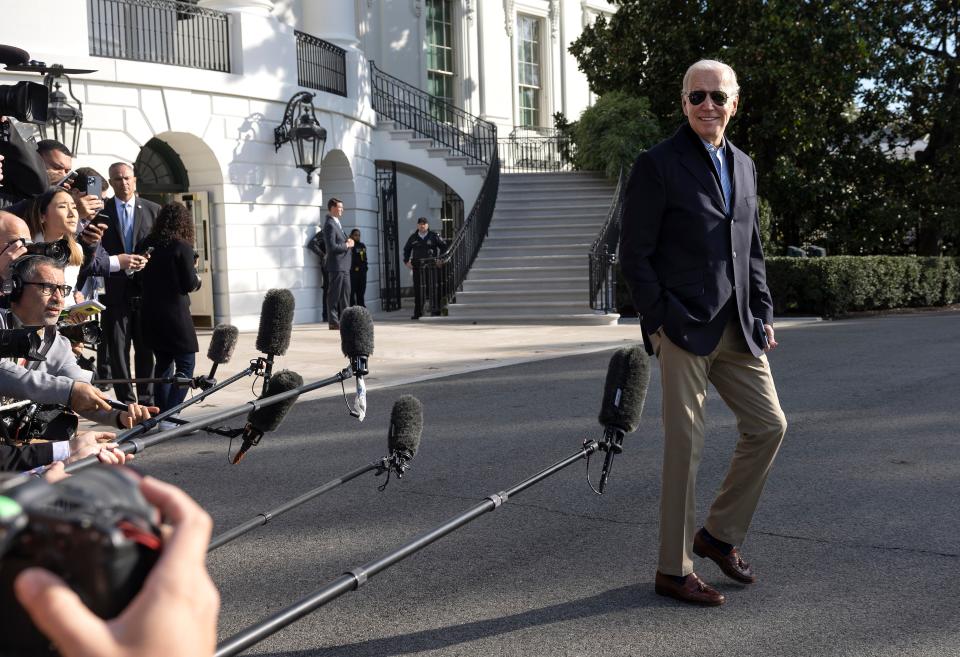Biden lays out national security strategy while re-evaluating Saudi relations
- Oops!Something went wrong.Please try again later.
- Oops!Something went wrong.Please try again later.
WASHINGTON – China and Russia pose the biggest challenge to international peace and stability, the Biden administration said Wednesday in formally laying out the president's national security strategy.
While Russia’s threat is immediate, China is the only competitor with the intent and ability to tilt the global playing field to its benefit, according to the White House.
“We are in the midst of a strategic competition to shape the future of the international order,” President Joe Biden said in the document released Wednesday that emphasizes the importance of building coalitions to counter security threats.
The strategic report came as the administration is re-evaluating its relationship with Saudi Arabia, an ally that angered the administration through the OPEC+ alliance’s decision to cut oil production.
"We will take action," Biden told reporters Wednesday as he left the White House for a multi-day trip to western states.
The latest
Every president since Ronald Reagan has used a national security report to Congress to give a high-level overview of their foreign policy priorities.
Donald Trump’s first strategy emphasized U.S. economic issues —trade, energy independence and tax reform.
The Biden administration delayed rolling out its report this year because of the fast-moving situation in Ukraine.
Russia’s invasion of Ukraine didn’t fundamentally alter Biden’s foreign policy strategy, according to national security adviser Jake Sullivan. But it “presents in living color the key elements of our approach: the emphasis on allies, the importance of strengthening the hand of the democratic world and standing up for our fellow democracies and for democratic values."

What's about to happen
Separate from the national security strategy, Biden is consulting with Congress on whether to take action against Saudi Arabia. The administration argues the Saudi Arabia-led oil cartel’s cut in production will help drive up the cost of gas, boosting Russia’s oil revenue just as the United States and its allies are trying to reduce Russia’s oil profits. Rising pump prices could also hurt Democrats in next month’s midterm elections.
Lawmakers have proposed blocking any future arms sales to the Saudis as well as allowing the Justice Department to use antitrust laws to challenge the OPEC+ countries and their state-owned oil companies.
Sullivan said Biden may take some actions “sooner” while other steps “could happen over a more extended time period.”
“All I will say right now is that the President is in the process of re-evaluation,” he said Wednesday.
While the security strategy doesn't mention Saudi Arabia specifically, in the section on the Middle East, the administration encourages "energy producers to use their resources to stabilize global energy markets, while also preparing for a clean energy future and protecting American consumers."
What they are saying
"Autocrats are working overtime to undermine democracy and export a model of governance marked by repression at home and coercion abroad," Biden said.
While the major powers are battling for domination, the United States also has to deal with transnational challenges of climate change, food insecurity, communicable diseases, terrorism, energy transition and inflation, Sullivan said.
“This strategy makes clear that these shared challenges are not marginal issues, they are not secondary to geopolitics,” Sullivan said.
Want to know more? Here's what you missed
From fist bump to humiliation: OPEC+ production cut leads Biden to 'revisit' Saudi relations
Biden: Middle East deal will boost gas extraction in Mediterranean, stabilize region
Executive action: Biden designates his first national monument in the heart of Colorado's Rocky Mountains
This article originally appeared on USA TODAY: Biden's national security strategy emphasizes China, Russia threats
